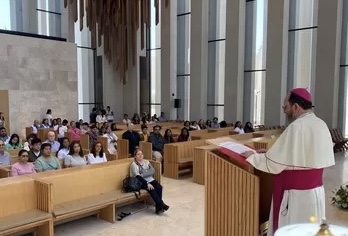Vicar of S Arabia speaks from the Church of St Francis for a 'more just and fraternal society'
This week, the prelate made his first pastoral visit to the Christian place of worship located in the Abrahamic Family House, which includes also a mosque and synagogue. Dialogue with people of different faiths "is not only desirable, but necessary." The local Christian community is “multi-ethnic and multicultural ever since its origin”. The prelate stressed that bearing witness to the faith "excludes any form of proselytism.”
Abu Dhabi (AsiaNews) – Bishop Paolo Martinelli, apostolic vicar of southern Arabia (United Arab Emirates, Oman, Yemen), made his first pastoral visit this week to the Church of St Francis, in Abu Dhabi, United Arab Emirates (UAE).
“In our world marked by so many conflicts, all religions are called to show that living our faith makes us better people and capable of building a more just and fraternal society,” the prelate said.
The Christian place of worship is part of the Abrahamic Family House, a complex that includes the church, but also a mosque and a synagogue, dedicated to interfaith dialogue where many “values are lived”, added the prelate, who thanked the faithful for their "participation" in this "unique" place in terms of values and testimony.
The Abrahamic Family House is the symbolic venue of dialogue between faiths in the UAE, and is one of the legacies of Pope Francis’s 2019 visit, when he and Grand Imam Ahmed al-Tayyeb signed the Document on Human Fraternity in the presence of more than 400 religious leaders to promote coexistence among peoples and fight extremism.
The House opened in mid-February last year, in the presence of leading figures from the three great monotheistic religions: Christianity, Islam, and Judaism.
The Church of St Francis the vicar visited is the first tangible sign of the journey that began with the document on fraternity signed by the pope and the grand imam, who is the highest authority in Sunni Islam, head of al-Azhar Mosque, and by extension al-Azhar University.
During his "first pastoral visit" to the church, Bishop Martinelli described it as something “very special” because it “is not simply a branch church of the cathedral”, but “the Church that the President of the United Arab Emirates His Highness Sheikh Mohamed bin Zayed Al Nahyan gifted to the Holy Father Pope Francis, and which is entrusted to the Apostolic Vicariate of Southern Arabia for its pastoral animation [sic). Therefore, it is a unique Church in the world.”
“Its location is also unique " and its “uniqueness [. . .] refers to the prophetic document on Human Fraternity, signed five years ago here in Abu Dhabi by Pope Francis and Ahmad al-Tayyeb, the grand Imam of Al Azhar.”
Speaking about “dialogue with people of different faiths," the vicar explains that "it is not only desirable, but also necessary" and “is not something that can only concern a group of intellectuals, but [touches] all the faithful.”
“The question of interreligious dialogue is a question internal to our faith and not just optional. This is true everywhere, but it is particularly true for us who live every day alongside people of different faiths” in a predominantly Muslim country, where Christians are mostly migrants from other Asian countries, especially the Philippines and India.
“When you come to this church for the Eucharistic celebration or for a moment of prayer, you enter a building complex where, in addition to the Catholic Church, there are also two other places of prayer: the Mosque and the Synagogue.” Thus, “when you go to church you are naturally led to recognize the presence of other religions and to practice a peaceful and constructive coexistence.”
“[T]he first fundamental element that the Christian community experiences and that it has in common with other religions is the certainty of the absolute centrality of God. All religions, despite their great diversity, are united by the reference to the mystery of God, the source and destiny of all living.”
Continuing his reflection on the Christian community, Bishop Martinelli defines it as “multi-ethnic and multicultural ever since its origin. But in spite of the diverse nature of community, there was a profound fraternal union among them [. . .] because in Christ they all recognized themselves as sons and daughters of the same Heavenly Father and animated by the same Spirit.”
Lastly, the vicar addressed the topics of evangelisation and proselytism, the importance of which is central in a mission land where Catholics, and Christians in general, are a minority.
“From the beginning, Christianity excludes any form of proselytism,” the prelate said, because it “spreads through testimony. [. . .] Being witnesses does not mean showing that we are good or better than others”; it means living “Christian testimony: in the family, at work, at school, with friends, in society.”
The faithful, he noted, must take as models and examples Saint Aretas and his companions “whose 1,500th anniversary of martyrdom we celebrate this year, which they suffered precisely in this Arab region.”
What is more, “A fundamental element of Christian testimony is also dialogue with people of different faiths. The love of Christ pushes us to mutual knowledge, to overcome prejudices and to build relations with mutual esteem, collaboration, peaceful coexistence and to work together for a more fraternal and human world”.
04/07/2022 14:08
10/09/2019 15:20







.png)










